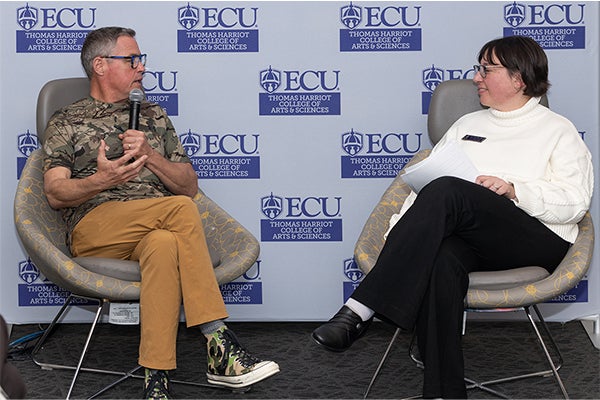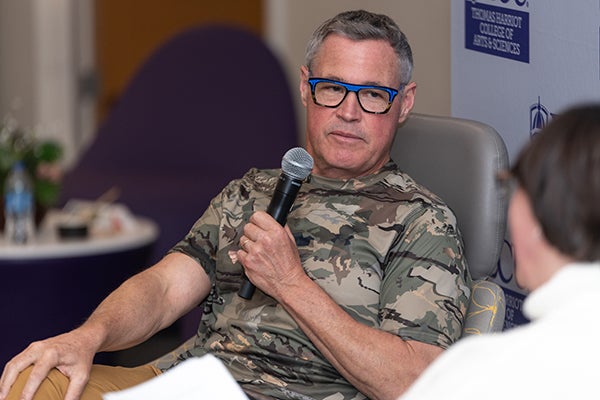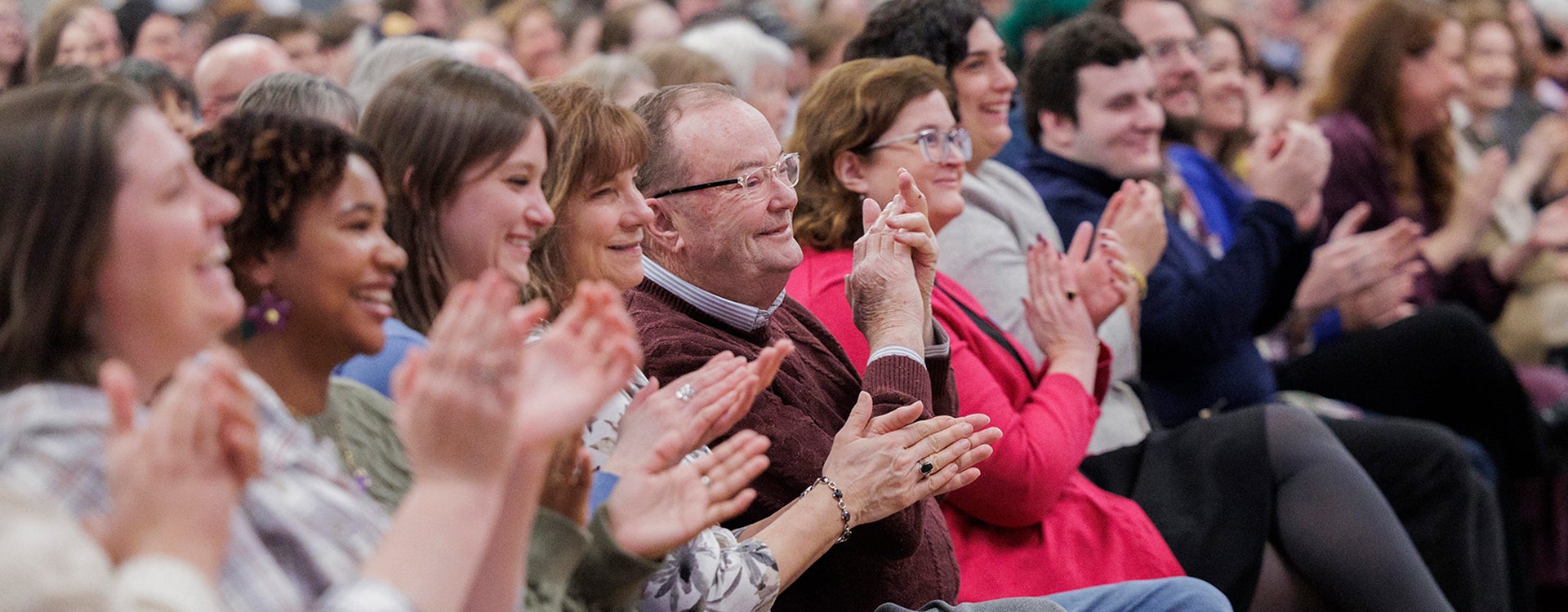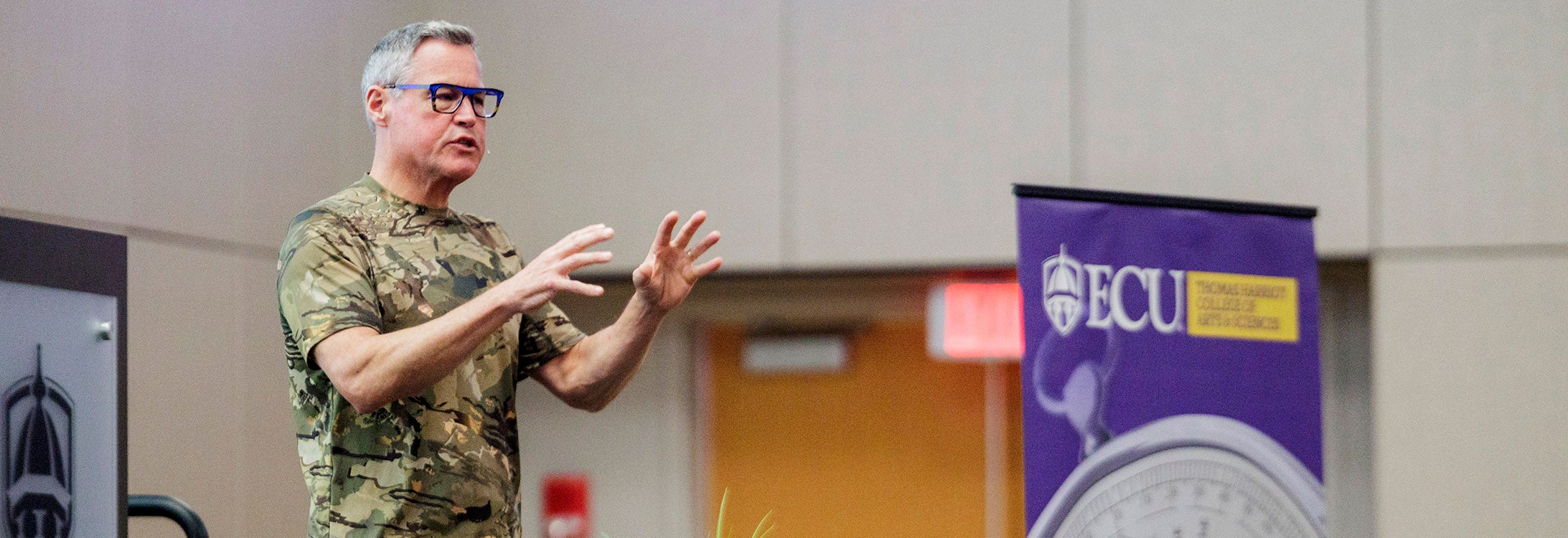Biologist Jeff Corwin stresses adaptability and hope in life and conservation
“In 100 years since the industrial period, humankind has consumed 75% of the planet’s nature,” said Jeff Corwin, television personality, biologist and wildlife conservationist. “Every half hour a species disappears on Earth, and people wonder why and if there is hope.”
And the answer, he said, “Of course there is.”
Corwin visited East Carolina University on Jan. 30 to share his “Tales from the Field” as the final guest for the Thomas Harriot College of Arts and Sciences 2024-25 signature event series, Voyages of Discovery.
Even with some disturbing facts of species decline, endangerment and extinction, Corwin stressed that there is hope. He said resiliency and adaptability are key and conservation begins in a person’s backyard.
“Conservation begins here, where you live,” he said.
For North Carolina, he said that could mean a habitat or coastal environment that needs help, a species that is distressed or an organization that could use volunteers. Even simple things like decreasing one-time-use plastics, reusing disposable bags and recycling make a difference.
“It was fun to meet Jeff Corwin,” said Skadi Kylander, a student in the interdisciplinary doctoral program in biology, biomedicine and chemistry, who led a small, casual student session with Corwin.
The students talked with Corwin about their research interests and what they want to do after completing their degrees. They asked him about what he sees as the public’s view of conservation, his greatest obstacles and his biggest successes.

At a reception before the lecture, Corwin sat down with Dr. Anne Spuches, professor in the Department of Chemistry, and answered a few questions from guests. (Photos by Rob Taylor Photography & Design)
“He shared several stories with us, not just about places he’s been and animals he’s seen, but also about positive ways to work with people to make the biggest difference you can on issues that impact both people and the environment,” Kylander said.
Many of the day’s attendees were thrilled to hear Corwin and even reminisced about growing up watching him on television. People may know Corwin as the host of Disney’s former television program, “Going Wild with Jeff Corwin,” or his current ABC series “Wildlife Nation.”
His new CBS television series “Extraordinary World,” which premiered in January, features Corwin’s partnership with The Brady Hunter Foundation to inspire viewers by shining a light on advocates who champion animal rights, environmental conservation and solutions to worldwide food insecurity.

Throughout the day, Corwin spoke about his career trajectory, how he became a conservationist and the little things people can do to be advocates in their communities. (Photos by Rob Taylor Photography & Design)
“It was so great getting to meet and hear Jeff Corwin talk. First, the sheer fact that we can get these famous speakers to ECU has been amazing, and he was so nice and humble,” said Victoria H. McGowen, a Greenville dentist and chair of the Harriot College Dean’s Advancement Council.
“I’m a ’90s kid and grew up watching all his shows. Several times during his talk, it felt surreal and emotional, almost like getting to be a kid again for an hour,” she said. “I also forgot how funny he was during his television series; I’ll be going back to rewatch the old shows and check into his new ones.”
Throughout the evening, Corwin told various stories from becoming a naturalist, herpetologist, conservationist and researcher, to receiving his biology and anthropology degrees and becoming a documentarian, author, commercial fisherman and father, to name some of his many roles.
Dr. Allison Danell, dean of Harriot College, said, “Corwin shared some amazing adventures from his long career, as well as sage advice for us as citizens and humans to take home with us about how we can work together to protect our planet and its biodiversity.”
Corwin fell in love with nature at the age of 6. He shared his experience of being amazed — with the innocence of a child — to “discover” a garter snake coiled up tightly in the yard of his grandparent’s house in Middleborough, Massachusetts.
He spotted the snake, which slithered deeper into the vegetation to avoid the young human, who, with his bare hands, dug through a pile of decomposing leaves and lifted the rotten bottom of a wood pile to grab the recoiled snake, which promptly latched onto his arm.
The situation that would have terrified most only spurred his curiosity. His dad pried the snake from his arm and freed it back into the wood pile.
“That was my gateway into nature. That day, I was hooked,” he said. “That was the day I became a naturalist.”
He learned as much as he could about snakes: their habitat, nature, defenses, renewal, medical uses, reproduction and finally, repulsion. At 8 years old, he observed this firsthand as a neighbor decapitated a snake he had grown to know.
“That was the day I became a conservationist. I knew I would spend my life not only working with and studying animals but working at some level of advocacy,” he said.
That was also the day Corwin said he learned “good people make bad decisions when they lack information.”
He discussed how our access to knowledge and truth has become so much easier with advances in technology and social media but that we have to be discerning.
“It is an opportunity for revelation and exploration,” he said.
To be an advocate, Corwin said a person needs to empower themselves, be armed with information, even if it’s information they do not want, and be proactive in being a part of something in a meaningful way.
“I look at the extinction crisis on our planet as a perfect extinction storm, and the elements that conspire together aren’t the wind, the rain and cold, the tide and lunar cycles. There are other elements,” he said. “They are habitat loss. They are climate change. They are the illegal black-market exploitation of wildlife, which is a $20 billion-a-year industry. It is pollution and it is driven by a fast-growing human population.”
Every year, Corwin said humans put 10 billion pounds of plastic into the oceans. Plastic bottles can spend 200 years in a landfill, if not longer before they find their way into a river, and microplastics have found their way into many species, including humans.
“This is why we find ourselves today — in an age of incredible scientific technology, ingenuity and enlightenment — to creep into the dark ages of conservation, where more animals are disappearing today than when dinosaurs were struck 64 million years ago,” he said.
The message is not all negative, however, and Corwin again reiterated hope and adaptability.
“Incredibly, through the fog and gloom, there is amazing hope,” he said. “America is the pioneer when it comes to conservation. We created the science of saving species. We created national parks for everyone to share and own as a legacy, and we have found a way to learn from our horrible mistakes and save what we have now.”
“When we come together, separate from our differences, we do incredible things. When we protect and save nature, we do it not just for nature, not just for altruistic reasons, we do it as an investment,” he said. “Because, by having a vibrant and healthy planet, we are securing the survival of the next generation.”

A crowd of students, faculty, staff and community members were excited to hear from Corwin at ECU on Jan. 30. They welcomed him and thanked him with cheers and applause. (Photo by Steven Mantilla)
